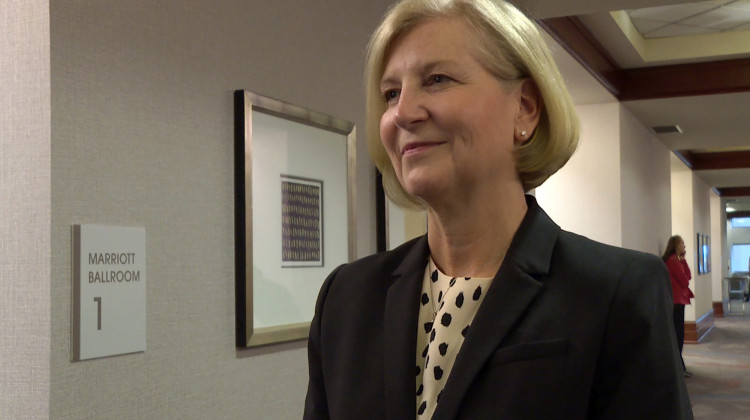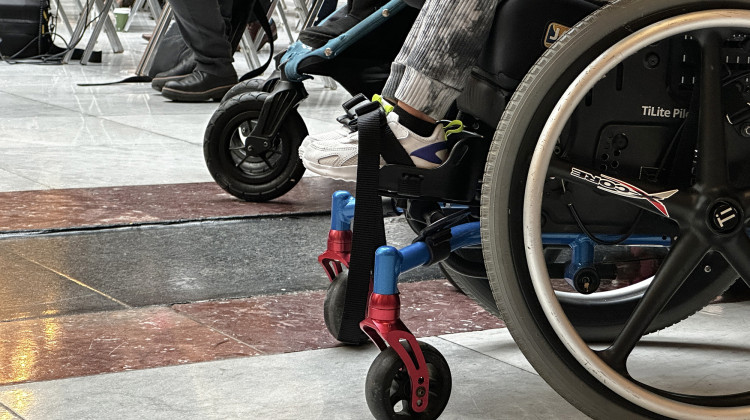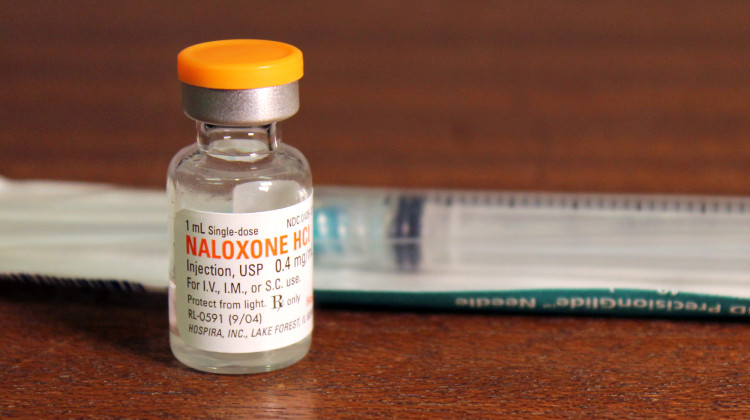
Indiana State Department of Health Commissioner Kristina Box discusses the state's infant and maternal mortality rates.
Jill Sheridan/IPB NewsIndiana has the seventh worst infant mortality rate and the third worst maternal mortality rate in the nation. Numerous bills this legislative session aim to address the issue. Indiana Public Broadcasting's Jill Sheridan spoke with Indiana State Department of Health Commissioner Kristina Box about a bill that aims to tackle the issue through a two pronged approach.
Jill Sheridan: Take us through some of the points of of the bill as it relates to these issues in Indiana.
Kristina Box: Most certainly, we believe that HB 1007 is going to decrease infant mortality and it's also going to decrease our maternal mortality. The major way that this bill will be able to do that is by addressing women that are covered by Medicaid in our highest risk zip codes and counties across the state and offering them the opportunity as part of their wraparound services to have a health care-based provider, whether that is a community health worker from the community, whether that is nurse-family partnerships, it may be para-medicine depending on certain of our counties that really don't have other opportunities, or it may be healthy families, which we have in all of our counties across the state.
The ability to attach women to a navigator say, an OB navigator, to walk through the pregnancy with them to make sure that they have an even deeper understanding of the risk factors that they are addressing – such as substance use disorder in pregnancy, smoking during pregnancy, getting into prenatal care in that first trimester and maintaining the care, and then the importance of maintaining that care for the child. Also addressing those socio-economic factors that we know can be a barrier that prevent women from getting into care early in pregnancy and maintaining that care.
Sheridan: Part of the bill also requires a new verbal screening.
Box: We're trying to address substance use disorder. As you know, we've had a pilot program in the state of Indiana since 2016. And we've been looking at umbilical cords of our babies that are at risk, and have found significant percentages of babies that are born exposed to different drugs.
And so what we want to make sure we're doing is that every pregnant woman receives a universal verbal screen as early in pregnancy as they are found to be pregnant, and then throughout pregnancy as indicated, because that then gives us the opportunity to have that brief intervention with that woman to not only address the education about whatever drugs or compounds she's using but also to explain to her the effects that that will have not only on her own health, but her baby's health.
Sheridan: When we're talking about the piece of the community health care workers and the OB navigators, and really sort of broadening our thoughts on, you know, who provides care to women as they go through pregnancy. That's really the point.
Box: What it is meant is to be an adjunct, it is that person that kind of comes alongside them and walk through that pregnancy in the first year of the baby's life, kind of like the navigation we have done in cancer now for a number of years.
And it's further reinforcement of the education that they're already getting from their own family providers.
Sheridan: As you mentioned, you know, there are great disparities and some of our rural areas, but also here in Marion County, I mean, women are really struggling to get care.
Box: Of our 16 highest zip codes, we have three of them in Lake County, we have six of them here in Marion County where we know that there is plenty of care available. It's just a question of not getting those women connected to care.
So that the hope is that if we can identify these women early in pregnancy, by Medicaid data that comes through, and then offer them this as a part of their wraparound Medicaid care to have an OB navigator walk through pregnancy with them, that we will be getting more women into care early in pregnancy.
Sheridan: And we know also that Indiana's rates have remained fairly stagnant as it relates to infant mortality. But black women and black babies in the state of Indiana fare much worse. Will this legislation be able to help them?
Box: We have seen our infant mortality rate as a state go down from 7.5 to 7.3. But unfortunately, at the same time, we saw black infant mortality go up from 14.4 to 15.3. Well over two and a half times the white infant mortality in our state. So we're our belief system is by implementing these programs in these high risks of codes, that we're going to be addressing the black and disparate populations that we're trying to make sure we're we're caring for.
 DONATE
DONATE








 View More Programs
View More Programs


 Support WFYI. We can't do it without you.
Support WFYI. We can't do it without you.